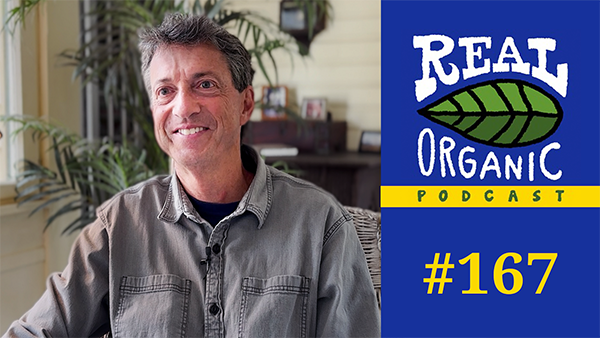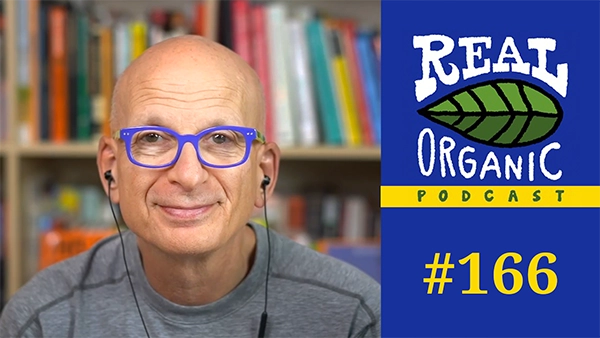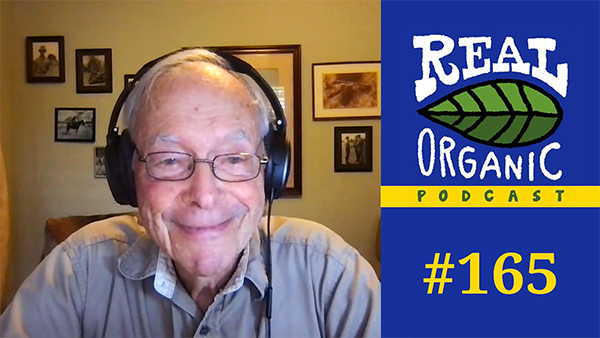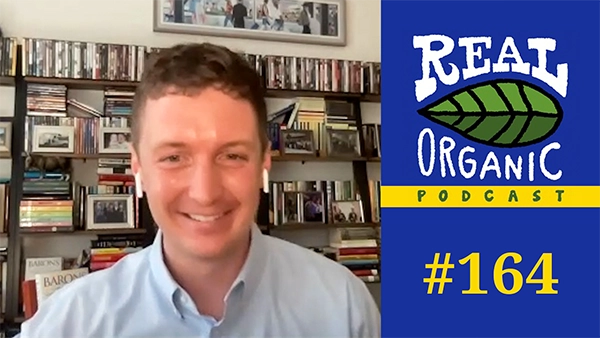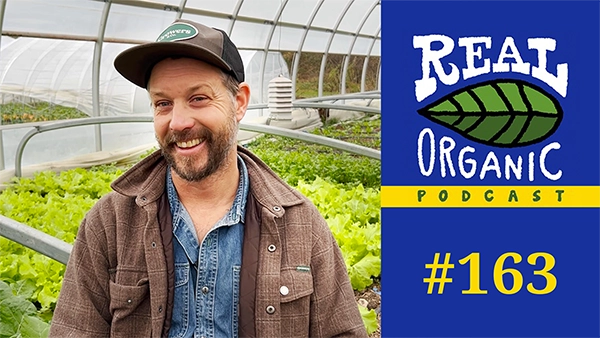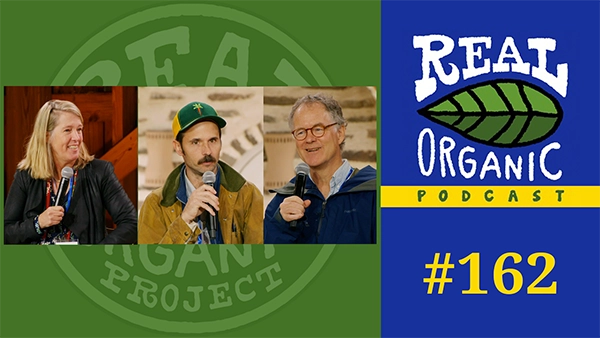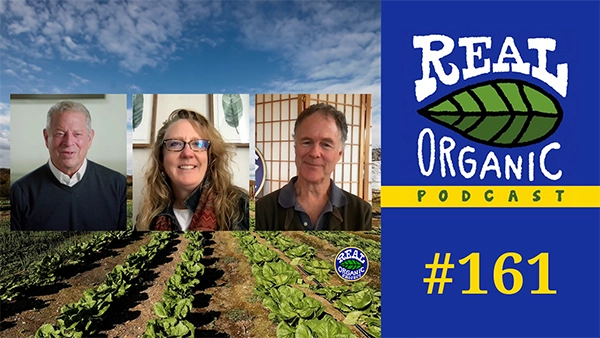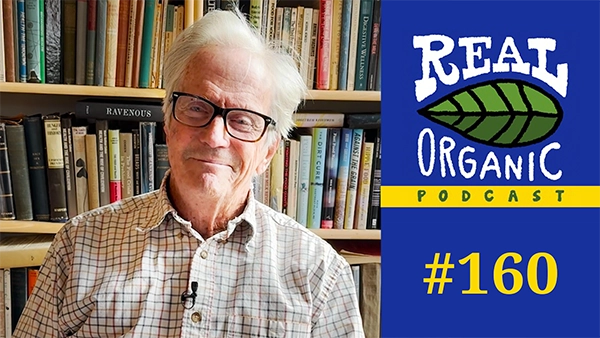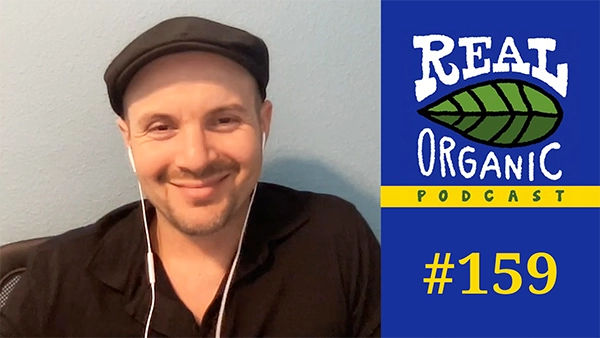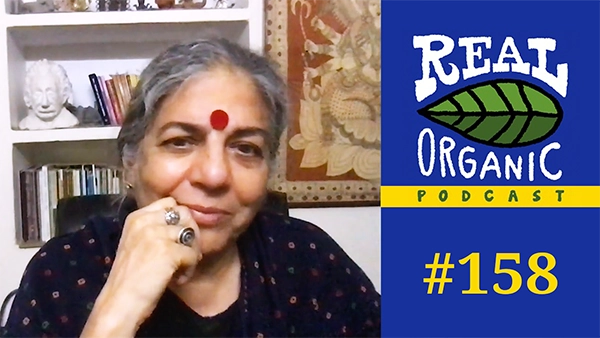Episode #024
Bill McKibben: Winning the Climate Argument But Losing the Fight
Welcome! You can subscribe and download episodes of our show through your favorite podcast app.
You can also subscribe to receive the video version of each episode on our YouTube channel.
Our Bill McKibben interview has been edited and condensed for clarity.
Dave Chapman: Welcome to the Real Organic Podcast. I’m talking today with Bill McKibben, a very well known author of many books, Eaarth, The End of Nature, Falter, and Oil and Honey. He’s also the co-founder of 350.org. Welcome Bill.
Bill McKibben: Well, what a pleasure to be with you, Dave, and thank you for having me on.
Dave Chapman: Absolutely. So before we dive into some of your life’s work, I would like to just touch a little bit about your life, about how you got to this work. I know you were born in California and you moved to Massachusetts. I read that your father actually was arrested at a protest for the Vietnam War?
Bill McKibben: My father was a journalist and a business journalist and not one to be involved in things like that. But at a certain point there in the Vietnam war the Vietnam Veterans Against The War, led by a then-young John Kerry, came to Lexington, Massachusetts, where we lived and wanted to camp out on the battle green. And in 400 or 500 towns, people went to stay with them and protect them from the police. And they were all arrested before the night was over.
Dave Chapman: And your father was one of those towns, people?
Bill McKibben: I was 10 or 11 at the time. And I can remember it well.
Dave Chapman: Yeah. Was thatyou know, it was such a, such a divided time in the country. Was that a very radical thing for him to do?
Bill McKibben: Yeah, in a way, I guess. But you know, it didn’t change his.. I mean, he kept being a business journalist and no one thought twice about it. I mean, it was a radically divided time in certain ways, but I think by that point, at least in Massachusetts, the sentiment had turned so strongly against the war that people were very grateful to those who were standing up.
Dave Chapman: Yeah. Well, I just wanted to get a sense of, of your roots. You, you went to Harvard.
Bill McKibben: I did. I followed in my father’s footsteps as a journalist and started working for the local paper when I was 13 or 14, and then went to Harvard where I mostly just worked on the newspaper there, the Harvard Crimson.
Dave Chapman: And after that, you went almost immediately to the New Yorker?
Bill McKibben: Yeah. About a week after I graduated, I started work as a staff writer at the new Yorker in New York city and spent five years there before I retreated to the countryside where I’ve been ever since.
Dave Chapman: Yeah. Well, that’s an amazing jump from, from being a college student, to being a staff writer for the New Yorker.
Bill McKibben: Yes. It was a bit of a fluke, but it was great fun and easier in those days because The Talk of the Town, which I was mostly writing, was all anonymous in those days. So people didn’t know that it was a stripling 21 year old that was doing a lot of the work.
Dave Chapman: Okay. And when you left that you went to Vermont immediately?
Bill McKibben: No, I moved to the Adirondacks. I’ve spent much of my life, pretty much all my adult life on either side of Lake Champlain, but the first long stretch of it was really quite deep in the woods in the central Adirondacks. We moved to Vermont about 20 years ago and we live in a town of about 500, which is a major metropolis compared with where we were living before.
Dave Chapman: All right. I know Ripton actually. I have friends there, too.
Bill McKibben: It’s a nice town. Very nice.
Dave Chapman: Well, when did you become engaged in environmentalism? When did you become an activist? How did that become a strong thing for you?
Bill McKibben: Well, I wrote the End of Nature in 1989. So I was 20, I guess I was 27 when I wrote it and 28 when it came out. And it was the first book about Climate Change for a general audience. And it did quite well, I think it’s in 24 languages or something. And so from that point on, I mean, I’ve been very enmeshed in this issue. But it took 10 or 15 years before that switched from mostly writing about it to mostly trying to act on it. And really the slowness of that was my own slowness and figuring out that I think I’d thought that we were having an argument and that as soon as we had a preponderance of evidence, clearly piled on one side, our leaders would do the right thing. It took me a while to figure out that we’d won the argument long before the science was abundantly clear.
We were just losing the fight because the fight wasn’t about data and reason, the fight was about what fights are usually about: money and power. And we were losing to the fossil fuel industry, which had plenty of both. So we knew we weren’t going to have much money, but we decided to see if we couldn’t build a movement. And because history indicates that occasionally big movements are able to stand up to big power, 350.org, which I helped form more than a decade ago. It was kind of the first iteration of a global grassroots climate movement. And now happily, there are many, many other iterations, you know, Sunrise Movement and the Green New Deal and Extinction Rebellion and Fridays for the Future, with school kids from around the planet and on and on and on.
Dave Chapman: Yeah, it’s interesting. You know, one of the things that I hear a lot is “why don’t we all get together and have one movement.” And I actually really like Paul Hawkens’ idea that it is one movement, but you know, he put it out forward and Blessed Unrest that we need the kind of social diversity as we would want there to be biological diversity in the soil for real health.
Bill McKibben: Well, that’s true. And an important part of movement building for us has been trying to figure out how to get all the different organizations to collaborate effectively. And that’s very useful.
Dave Chapman: Yeah.
Bill McKibben: We’ve seen great examples in the fights over the Keystone pipeline or the Dakota access pipeline or fossil fuel divestment or lots and lots and lots of collaboration from the big, you know, old line green environmental groups, like the Sierra Club to environmental justice groups. So much of the leadership coming from indigenous communities, frontline communities, that part’s really been fun.
Dave Chapman: So when you say that you moved from participating in what you saw as a public debate, to moving more towards direct, if I’ve got that right, towards political action when it was still on the level of a public debate, when you were writing the End of Nature, what kind of change did that make in your life personally? I mean you were a very good writer and you were writing a lot, and I can tell you writing was moving a lot of people, it was building a movement, but you see it as something quite different.
Bill McKibben: Well I don’t see it as something quite, different I mean they’re quite related and I continue to do a lot of writing. And that’s really how I think of myself. I’m not a trained organizer and I’m not, you know, whatever, we just made it up as we went along. But I mean, just in day to day terms, it meant that I was constantly on the road because at 350.Org we were organizing around the planet. I mean, we’ve organized demonstrations in every country except North Korea. So I spent a number of years, you know way more than I was home and in absolutely constant motion and happily, I was smart enough while I was doing it to be training up a crew of young people who now run the whole thing. So at least I was wise enough to do that, because the pace of doing that for five or six years – if I had done it too much longer, you know it would have done me in.
Dave Chapman: Yeah. Yeah. So can we go to the beginning of 350.org and what that looked like? How did that happen?
Bill McKibben: We formed 350 and as I say, we didn’t know what we were doing, but I had organized a little March down the Western edge of Vermont in the summer of 2006. We spent four or five days walking from Ripton to Burlington. By the time we got there, we had a thousand people, which is good number for Vermont, but the scary thing was the papers. The next day said it was probably the largest demonstration about Climate Change that had yet taken place in the U S and that really underscored just how much, you know, how much room there was for organizing. We had all the things you’d need for movement: policy people and scientists and Al Gore. And the only part of the movement we lacked was the movement part. So we set to work building it.
We, in this case being me and seven then-undergraduates at Middlebury College where I was teaching. These were remarkable young people who’ve all continued to do great work in this field. And you know, we just started organizing and reaching out around the world. Our first big day of climate action really, the first planet-scale day of action around Climate Change, was in the fall of 2009. And I think we had 5,200 demonstrations in 181 countries. CNN said it was the most widespread day of political action in the planet’s history. And from there, we kept doing that kind of organizing. And we also started the kind of more militant organizing around fossil fuel infrastructure beginning with the Keystone pipeline and around fossil fuel financing beginning with this divestment campaign. It’s become the biggest anti-corporate campaign in history. We’re at about $14 trillion now in endowments and portfolios that have divested in part or in whole from fossil fuel.
Dave Chapman: So that’s a remarkable list of achievements. I know there’s so much to go, but it is amazing to go from a March of a thousand people in Vermont to a rally in 181 countries. Was that with seven students essentially organizing it?
Bill McKibben: Yeah. Well, I mean, part of it, of course, is that you can’t really organize 5,200 different events. And so it was much, much closer to like a potluck supper, you know. We’d set the date and the theme and then just reach out to people to bring what they could, and it turned out there was a great deal of kind of latent demand. There was an ecological niche to be filled. There were people all over the world very worried about Climate Change, but not feeling like they had some way to make that worry felt. And so it was really important at those early stages to kind of demonstrate that there were other people who are feeling the same way and to start work down this path.
Dave Chapman: Yeah, you know, as we, as we formed the Real OrganicPproject I felt like we were stepping into a vast field of depression, where so many people had worked for years for something that they believed in and they felt they’d lost it to the corporations, and to the government through the influence of the corporations. And they were depressed and they were hopeless. It was interesting. And all they needed was like a few people to say, you know, “let’s get together” and, and “we can do this ourselves.”
Bill McKibben: Yeah. Isn’t that interesting? One of the things that I’ve also been impressed with, is the fact that more often than I would expect when you fight you win. Even up against very, very big powerful corporations and things, we’ve been able to start winning a series of victories. Not enough to turn around Climate Change yet, but definitely enough to weaken the power of the fossil fuel industry and their ability to dictate the political terms of things. I think that if Donald Trump, knock on wood and pray to God, gets voted out of office, it will become abundantly clear to everyone how much ground the fossil fuel industry has lost. Cause he’s pretty much what they’ve got going for them at this point.
Dave Chapman: Right, right. There’s a famous line from Michael Pollan I think, it was actually – he might’ve been quoting Obama saying – “you know, until we can let up the switchboards, we don’t have a food movement.” And,o I think that what you’ve been doing is make it that you can light up the switchboards.
Bill McKibben: Absolutely. And of course, Michael is a great thinker about these kinds of things, and he’s been a great help at many turns, and I’m so glad that he’s done such a good job of thinking about how these things relate across other areas, you know?
Dave Chapman: Yeah. Well, I think that actually we’ll talk about some of the very strong connections between what we’re doing and what you’ve been doing for the last 14 years. Cause I think they’re there, but in even regardless of the immediate connections, I’m fascinated by how building a movement requires getting people to find each other. There needs to be connections. You’ve taken a tremendous number of people all over the world who have a common goal, a common desire, but you’ve woven those people together so that the fabric is stronger.
Bill McKibben: That’s been the hope. You know, we were kind of lucky. When 350.org started in the early days of social media Facebook barely existed. And it hadn’t turned into a horror show yet.Twitter didn’t exist yet, but we had things like Flickr that allowed us to communicate pretty easily. And so people called it the first kind of open source campaigning and people were still very interested, you know. The internet hadn’t yet become quite the oppressive force it’s become now. So we had a sweet spot in there when it was quite possible to quickly get people engaged.
Dave Chapman: And how do you think that’s changed with the internet? Cause I’m kind of wrestling with that. It seems like something that had such a promise of being a democratizing force is actually being used as a weapon against democracy.
Bill McKibben: Yeah. No, it’s a sewer misinformation and craziness and, and nastiness and all that. There’s no choice but to make use of it some, but it’s… Well, I’m glad we’re not trying to start 350.org now.
Dave Chapman: You think it would be much harder?
Bill McKibben: I do. I think there’s a lot more noise in the system.
Dave Chapman: Is that just because there is so much noise or because the system itself has gotten more sophisticated at filtering out certain voices?
Bill McKibben: Probably some of each, I mean, great voices can still break through, I mean, witness Greta Thunberg you know. And all the other 10,000 Greta Thunbergs scattered around the world, who’ve done an amazing job these last years. But it’s harder and the pushback comes more immediately, and I mean, those kids are enduring things online that nobody should have to endure, especially not young people.
Dave Chapman: So there is this dynamic tension between the local and the enormous world movement. And it’s something that we all deal with. And it’s so tempting to say, “I’m just going to think locally,” or “I’m just going to act locally.” And I see that when we look at the real challenges, the existential challenges that we face – Climate Change and, you know, nuclear war, these are things that can only be dealt with on an international level.
Bill McKibben: Well, that’s one of the interesting things. I mean, Climate Change obviously has to, you know, it would it help to deal with it at an international level. They don’t call it “global” warming for nothing, but it also has to be dealt with on the local level. I mean, the UN isn’t going to put new insulation in your attic for you, you know? They’re not going to make sure you have a heat pump instead of an oil burner. You know, they’re not going to come put solar panels on the roof of your garage, or whatever it is. So it has to be dealt with at every level. That’s one of the reasons that it’s difficult. We have to move very, very quickly and our systems at most levels aren’t set up to move quickly. At the local level actually, in a certain way, we can move a little faster and more nimbly than some of the others sometimes.
Dave Chapman: Yeah, yeah, for sure. It is possible to change;, to have a March in Vermont and get a thousand people to come if that’s not a huge sell.
Bill McKibben: But it’s..I confess it’s been sobering to see how difficult it’s been to get, say Vermont, which you think would be pretty easy to change. Vermont’s just to give you an example, Vermont’s pension fund continues to be invested in fossil fuel companies. They’ve refused to divest even after thousands of universities and churches and huge endowments and insurance companies and everybody else who’s divested. So you know, even in the places that should be easiest, you get obstruction and delay and, you know, inertia itself is just an extraordinarily powerful force.
Dave Chapman: Yeah. Yeah. Sometimes when I look at places like Denmark, which is Paul Hawken says, “oh, you can’t use Denmark,” but I look at what they’re able to do in government there. And just in the world of organic, you know, they’ve made a huge commitment to take the country as far and as close to being all organic as they can. And I thought, well, that’s pretty big for the US, but maybe we could do it in Vermont? But you’re right. Even here it’s not easy.
Bill McKibben: The Scandinavian countries may actually be in a kind of sweet spot there. They’ve got strong national governments, but they’re small enough that everybody feels a part of things. There’s a high levels of social trust which is very useful. We’re finding out in the pandemic what a disaster it is to have low levels of social trust. And you know, they’re wealthy and all the other things that make life a little easier but they really are a good model for what we could be doing on a thousand different topics in this world.
Dave Chapman: So most of, most of your work has been about challenging the fossil fuel industry and about dramatically trying reduce our use of fossil fuels in order to stop the release of carbon into the atmosphere, to stop the increase of the greenhouse effect. I am curious, because there is a lot of information out there now relating to agriculture and its impact on Climate Change. And you yourself have put out some good information on the impact of Climate Change on agriculture, which was interesting. In Falter, you really addressed that agriculture is going to change pretty dramatically and pretty rapidly as a result of Climate Change. Can you talk a little bit about that?
Bill McKibben: Yep. It’s a tough time to be a farmer. You know, farming is hard work in the best of times and it requires a lot of judgment. But now that that work is getting all but impossible in a lot of places because it’s no longer possible to count on traditional patterns of rainfall, of seasonality, of temperature variation or pest dispersal. All those things are changed in the most dramatic ways by Climate Change. And so, you know, you watch year in and year out. You know, one year it’s so hot in the Midwest that corn can’t really fertilize cause it’s above 95 in the crucial week and the next year, it’s so wet that people can’t get their tractors in the field. And, you know, right now the Central Valley of California, which is, you know, by far the most agriculturally-important few square miles in America, you can’t harvest anything cause you can’t go outside cause the wildfire smoke is so dangerous.
Although I did see horrifying pictures of migrant laborers picking cucumbers using the flashlights on their cell phones to find them amidst the gloom of the wildfires. So it’s a very hard time. The good news is perhaps that there may be ways for agriculture to play a real role in helping here, too. I don’t want to overstate it. I mean, the first thing is that we think agriculture is responsible for about 18% or so greenhouse gas emissions. Most of that comes from livestock from cattle but 18% is not gonna save the world. But you know, it’s not nothing either. That’s would be a big help.
I think the way to think about it is much of the work we’re doing at the moment around renewable energy and cracking down on the fossil fuel industry has to do with how much carbon we’re pouring. If you think of this system as like a bathtub, you know, we’re trying to shut down the spigot so that there’s not more carbon pouring into the system, but we’ve already got too much in the system. I mean, we need to be at 350 parts per million CO2 or less and we’re at about 415 parts per million. So we’re already way past where we should be. And that means we also need to somehow widen the drain at the bottom of the bathtub, too, and figure out ways to soak up more carbon. And one way to do that would be to have healthier soils that are more likely to take up more carbon and methane from the atmosphere.
So that’s why people are getting so excited about regenerative agriculture and so on and so forth. I think those things are very exciting. I got to go out to see my old friend Wes Jackson at the Land Institute last autumn and give the big talk at their annual Prairie Festival. And that’s what I devoted it to. And they were having a seminar with a lot of scientists there talking about it [organic /regenerative agriculture]. The one caution I would add, however, is that this is not going to be an easy or quick fix. I mean, it’s really hard to take on the oil companies. They’re incredibly rich and powerful, but the advantage is that they’re a manageable target set. There’s 15 of them, you know? There’s a billion farmers on the planet. They have in many cases, long set cultural and agricultural practices. I’ve spent my life in rural America, so I know a lot of farmers are just stubborn anyway, you know, and don’t like, for good reasons, don’t like being told what to do by anybody.
So, it’s not like five years from now we’re going to, you know, everybody, every farmer in the world [will become an organic/regenerative farmer]. But I do think that the ground for change is there. And I have a feeling that it’s the next one of the places we really need to be working. I mean, at this point, individual change doesn’t get us that far. We need big structural change. And the avenue for that most likely is the Farm Bill. And the next one can’t just be what it usually is, which is just another rubber stamp subsidy giveaway to big commodity farming. I mean, we actually have to grapple with the fact that the soil of the United States is an important strategic asset that we’ve got to for many reasons pay attention to.
Dave Chapman: Yeah. All right. Well, there’s a lot there. I want to unpack a few things. One is and I’m just curious cause I’ve seen different numbers for the contribution of agriculture to Climate Change and I think 14% was the lowest I’ve seen. And 51% is the highest.
Bill McKibben: I think people have taken apart the 51% number pretty powerfully. The FAO says 18%. 18% is what I’ve seen. But I mean, at any rate it’s large. It’s large and partly it depends on how you’re counting – deforestation in the tropics is a big part of that – and how you’re counting that and what you’re allocating it to is a big part. So at the moment that’s going terribly. Brazil has a Trump-like president who’s, you know… I mean, Brazil had made real and powerful progress in protecting the Amazon. It was one of the few real success stories on the planet and that success has been turned upside down by Bolsonaro, which is a huge problem.
Dave Chapman: So there are different aspects of agriculture that are impactful and perhaps the biggest one is the industrial confinement livestock operations. And as you say, the clear cutting is mostly to grow food for those confinement operations. The methane from the cattle has much, much greater impact if those cattle are in confinement rather than out on pasture.
Bill McKibben: Right. And there’s at least some reason to think that done wisely, having animals on pasture is a technology for improving soil instead of degradingit. You know, there’s been a lot of interesting work done around rotational grazing and so on. I mean, again, we’re still kind of early days with this and the results as you would expect differ enormously from whether you’re in a moist tropical environment or an arid steppe, or wherever you are. I mean, we graze cattle almost every place that we can on the planet. And the results of things like rotational grazing are very dependent on those factors, but there’s definitely provocative hints that there’s good possibilities there.
Dave Chapman: So the thing that is for me both a tremendous opportunity and also somewhat of a tragic problem is that real organic farming is the kind of farming we’re talking about, where the animals are on pasture. And it’s marvelous to see that that millions of people are turning to buy organic food now in the stores. That is only a wonderful event. That is success, that they’re turning away from chemical agriculture. The tragedy for me is that a lot of certified organic food now is coming from confinement dairy, confinement poultry. That’s one of the big reasons that the Real Organic Project exists, because we don’t want to lose this opportunity to give people a way of supporting this agriculture.
Bill McKibben: Absolutely. That’s why these guys started figuring this out, you know. But clearly ,the spirit of the enterprise is different from where it began. And of course it’s why so many people are now at least as equally interested in local food and should be. Something that’s interested me for a long time, you know, I think I taught the first course on local food production at an American college in 2000 at Middlebury – and I know it was early on because we had nothing to read. I mean, Michael Pollan hadn’t written anything yet about any of this. And all we had to read and fall back on of course was, was Wendell Berry, who’s my old and dear friend who’s been at this as long as his entire life. You knowit’s been beautiful to watch that movement blossom. And one of the few cheerful things one can say about 2020 is that it feels like a lot more people sort of joined in as the pandemic took hold. You know I think we can trust our friends at places like High Mowing Seeds who report extraordinary demand for their productand you know, I read you can’t even hardly buy a chick at the moment to start a flock with.
Dave Chapman: And so that, that’s why we’re working so hard to try and make sure that if you don’t know your farmer, can you trust what you’re getting? Because of course, you know, for somebody in Vermont, it’s relatively easy to know your farmer, at least some of the year, but if you’re like my son and you live in New York city, then it’s a tougher game. Let me ask a question about one other aspect of agriculture and climate that was new to me. I don’t know if you know Walter Jehne or not, but he’s an Australian soil microbiologist and he’s come to Vermont and given some workshops over on our side of the state. And of course he talks about drawdown and carbon sequestration, but he’s also talking about the need to cool the planet and reverse desertification and that the same things accomplish both. That the very things that you would do to – he would talk about the soil carbon sponge – to increase the soil carbon sponge, or the things that increase the water-holding capacity of the land and increase the ability to keep the land green longer.
Bill McKibben: So what are his techniques? What is he using accomplish this?
Dave Chapman: I think he’s talking about verywhat we would now call standard organic/ regenerative agriculture. You know, reduced tillage; I’ve not heard him insist on no till, but reduce tillage, minimize it keep it green as long in the year as you can. And of course his experience in Australia is much more with what I think Allan Savory would call “brittle.” Arid systems, very arid systems and using animals skillfully. So you know, keep the pastures rotating and then recovering before you return the animals.
Bill McKibben: I mean, there’s all kinds of different, interesting iterations of this, especially in tropical areas. This sort of move to agroforestry has been really, really interesting, and people figuring out how to use shade as a kind of tool and figuring out how to have a real diversity of crops. You know, I mean, one of the many real problems with the agricultural model we’ve adopted is everybody just grows one thing, you know. And hey, it must be boring as hell for farmers to just year after year produce soybeans by the hundreds of acres, you know? But I mean, if you can figure out how to make it work economically, it’s obviously way more sensible to use a piece of land to produce a lot of different things at different times of the year and a different heights and so on. So that kind of permaculture notion is, is spreading nicely too, I think.
Dave Chapman: Yeah. And one of the things that is striking to me in this kind of agriculture that we’re talking about – and I call it real organic, a lot of people call it regenerative – is the thing that you need to add, by and large, is information, is knowledge. It’s not actually that we need new technology in terms of new machinery or something like that. We mostly just need to be very skillful.
Bill McKibben: Yes. You also need a fair amount of elbow grease, too.
Dave Chapman: Of course, that’s true. That’s true even for the most industrial farm, is that it is a lot of hard work. But one of the things that I believe, and I, I think that for most small farmers, the biggest challenge that they face, isn’t how to grow their crop, it’s how to sell it.
Bill McKibben: I think that’s right. I think that’s right. And I think your emphasis on information is powerful. I mean, there was a day when the extension services really were a huge help here, but in too many cases, they get kind of captured by, you know, industrial agriculture. There’s been a great move around much of the world, again, I think especially in the tropics, in rice-growing areas and things, to farmer schools. Where farmers are really good about teaching, you know, the sort of the equivalent of what farmers would call field days here, or something. And these have gotten to a large scale and people are really learning how to do low-input rice cultivation and that kind of thing.
Dave Chapman: Yeah.
Bill McKibben: So it helps to have a density, a greater density of farmers on the ground than we do. You know, it’s one of the problems with having so few farmers is that there are fewer people to lean on for information, ideas, whatever.
Dave Chapman: Yeah. I know that in the Midwest they’re getting fewer and fewer farmers, bigger and bigger farms. Actually in the Northeast, we’re getting more,
Bill McKibben: Absolutely lots of small farms. And it’s fun to watch that. I mean, you’re seeing it over there in the Connecticut River Valley and we can definitely see it in the Champlain Valley, you know? And I’ve been impressed in Vermont with what a terrific battery the Intervale turned out to be for producing [farmers]. I mean, that was the perfect example of a place where people could come together and learn a craft from each other. You know, everybody there is now just kind of spinning off across the region to do their farming.
Dave Chapman: Actually by creating a hub, literally they call it a “hub,” they’re able to create some marketing momentum. So, one of the things I’m wondering about here is your thoughts about..you’ve been very involved in connecting people to limit and stop the fossil fuel industry from expanding and to find alternative ways of providing the energy that people need in the world. Do you think that that kind of social movement is important in terms of people supporting the kind of agriculture that will also enhance their lives?
Bill McKibben: Absolutely. And as I say that, we’re at a point now where because climate change is moving so fast and needs to be arrested so quickly, that I think it’s probably the most important part of that work. I mean, yes, there’s a lot of marketing and, you know, all of that to worry about, but we also need just powerful political presence around agriculture, just as around energy. Because right now everybody has to swim upstream all the time. You’re always fighting the force of gravity. I mean, gravity in this case, meaning a subsidy program that literally subsidizes two things: corn and soybeans, and leaves everything else to fend for itself. So changing that to give some more room some more space for other things to flourish, that’s really a political task above all.
Dave Chapman: Okay. And your thoughts about how to approach that political tasks?
Bill McKibben: Well, I mean, one of the problems is that the places that you’d normally turn to have sort of been co-opted. The farm bureau really too often exists as a kind of mouthpiece for industrial agriculture. I’ve been very happy to see the Grange movement reappearing in some places and it’s possible it could be a political force. But we need eaters to be as prominent in this fight as farmers, you know? Cause it turns out there’s a lot more eaters than there are farmers. And those people demanding political change the next time the Farm Bill comes up is really important. So it’s incumbent upon movements to come up with two or three clear spreadable, understandable demands out of the next Farm Bill. And then for the rest of us to try and figure out how to put pressure on as best we can.
Dave Chapman: Yeah. At one of our first rallies, Chellie Pingree came over from Maine and you know, she’s a great champion and Pat Leahy spoke well spoke. It was a really fun party actually. And Chellie was really good. And she said, “you know, there’s $320 million a year being spent in Washington on food lobbyists who are trying to shape the opinions of our government.” She said, “that’s more money than spent in a year by the defense industry.” So, you know, they really want to change what gets sold as organic. So you have your work cut out for you. We have our work cut out for us. And I thought, yeah, it’s really hard when we’re up against these forces, because in the end, as you say, the farms are getting bigger and there’s fewer and fewer. So the money is getting consolidated. In the supermarkets, the same thing is happening. The processors, the same thing is happening. And so when a lot of money is in a few hands, they’re very good at using that money to influence the process, to support what they would like to see.
Bill McKibben: Absolutely. And, and, you know all things being equal, they will always win because they’re there 24-7. I mean, they have one job and it’s to secure favors for their industry. If one lobbyist burns out, you just plug another one in, you know? And they’re aware that activists and things tend to be sporadic in their attentions; fierce one moment and, and tired the next. So we do have to figure out ways to keep that pressure ongoing all the time. And why it’s really important that we have lobbyists from places like the Sierra Club or wherever it is, that are working. They’re out-manned and outspent, but we can make up for that by having enough people behind them, that politicians are a little worried about offending them.
Dave Chapman: Yeah. I asked a friend of mine in Denmark, “how were you so successful in getting the organic movement to be embraced by the government?” And he said, “we partnered with the environmental movement very strongly. And they perceived that we were their allies. We knew that they were our allies and together we were able to be much more effective with the government.” Absolutely. Yeah. Sothere is an attitude that is that government is bad. There’s almost actually I would say an ideology or an article of faith, and it may be our current government that, that well..
Bill McKibben: I mean, it was Ronald Reagan really in our lifetimes who introduced this idea that the government was the problem, not the solution, you know? Reagan’s favorite laugh line in speeches for years was “the nine scariest words in the English language are I’m from the government and I’m here to help.” But it turns out that’s nonsense. I mean, the scariest words in the English language are “we’ve run out of ventilators” or “the hillside behind your house has caught on fire,” you know? And you can’t solve those with market forces. You solve them with social solidarity, with governments that people have built to do the work that we need governments to do. And I hope that that might be one lesson people are taking from this pandemic year.
Dave Chapman: Yeah, that’s great. Do you see those California fires as a manifestation of Climate Change?
Bill McKibben: Oh, they’re precisely what scientists have told us is going to happen for a long time and they’ve been steadily increasing. I mean, we had the highest temperature ever reliably recorded on earth this summer in California. It was 130 degrees Fahrenheit at Death Valley. That’s really scary, but Death Valley is supposed to be awfully hot. Two weeks ago, I don’t know if you’ve ever been to San Luis Obispo in California, but it’s just a few miles from the Pacific ocean, and the temperature there got to 120 degrees. I mean, this is a place where people are trying to farm and 120 degrees that’s, you know… And so when it gets super hot like that, Dave, the first thing that happens is the soil moisture just dries out. I mean, it happens so fast. The curves are incredible. And once the soil moisture is all gone, I mean, fires just explode. I mean, we’ve always had forest fires. We just never had explosive forest fires like this that go off like bombs and two days later have covered 400,000 acres.
Dave Chapman: And not only is it so destructive of the human civilization in the area, but it also has tremendous carbon release.
Bill McKibben: Well, yeah, exactly. Right. The feedback loops are intense and growing. Truly the scariest fires this year probably aren’t even the ones in California or Australia, terrifying as those are. There are massive fires up in Siberia for the third year in a row. And there was this report last week that these fires have now begun to burn into the peat lands of the far north and those peat lands are a storehouse of huge quantities of carbon. The idea of that going up in smoke is really terrifying.
Dave Chapman: Yeah. It was really interesting when I was reading Falter that you were talking about higher CO2 levels and its impact on the nutrition of food. Could you talk about that?
Bill McKibben: Yeah, there’ve been a couple of big studies in the last couple of years indicating that food in essence is becoming less nutritious over time. They are less nutrients. And one reason has to do with growth patterns under elevated conditions of CO2 and higher temperaturea. We’ve always known that CO2 all things being equal increases plant growth, but it’s not going to do it in a way that’s useful for us, because it’s rarely the limiting factor. But it means that as things grow, they grow differently and are less nutritious – and the numbers are pretty startling I’ve got to say. People have gone back and looked at things, they have samples over the last hundred years, of like Golden Rod, and the protein content just goes down and down and down and down and down.
Dave Chapman: That’s so interesting because of course I’ve been tracking that and Don Davis’s work on nutrition and we were attributing that entirely to chemical fertilization, the loss of organic matter in the soil, which I think is true.
Bill McKibben: Absolutely. I mean, as John Muier once said, you know, you pull one thing in nature and everything is hitched to it. All bad ideas seem to compound each other. And when they get to food, they get to the most important…I mean, look, there’s a lot of questions that humans ask and answer every day, but the most important of those questions is “what’s for dinner? And is there going to be any?” I mean, that’s the most bottom line question for human beings and if you can’t answer that question, then you can’t have anything like a civilization.
Dave Chapman: Yeah. Yeah. I think Walter said and I think it was something that came out ofArab Spring and the tremendous unrest there, is “72 hours is what is separates us from essentially the disintegration of any society.” 72 hours without food. If you don’t have any, then you know, after three days, things are going to get wild. Yeah. Two more things.. You said a really interesting thing about if Earth’s history was put on a 24 hour timescale, could you repeat that and talking about what a little blip we are?
Bill McKibben: Yeah. I can’t quite remember the numbers. I think that 10,000 years of human history is like a fifth of a second or something. So, it seems all consuming to us, but it’s a pretty short. And in that time, the stuff we’ve done is… I mean, in the last 500 years, we’ve emerged as an absolutely geological force. I mean, you know, people will be able to – assuming we have descendants – they’ll be able to track our period in time for many, many millions of years, by looking at the geological record. I mean, we have disrupted the world around us in incredibly profound ways and in very, very sad ways. There was a study yesterday that showed that the number of wild animals on earth has dropped 68% since 1970. You and I were alive in 1970. The thought that there are 70% fewer wild animals on this planet than there were then is… Well, it should make us feel ashamed.
Dave Chapman: Yeah. You’ve been a tremendous voice in calling out to reverse that and in trying to be a positive force on the planet instead of a negative one. Do you have any words of encouragement for people about that as we go forward? I know, I know you have to tell a hard truth.
Bill McKibben: Well, I mean, I think that the thing to remind ourselves is we’re in one of those rare moments in human history when things really are on the line. It’s not the first time, you know. Our grandparents, our parents, grandparents, you know, had to face down fascism in the middle of the last century and to do it, they traveled to Europe and either killed or got killed, you know? So that’s harder than what we have to do. But we have to do big stuff and we have to do it fast. And I think the only thing to just keep bearing in mind is the most important thing an individual can do is be a little bit less of an individual. Find some other people in some established campaign or movement to work with so that your voice really will tell [and be heard]. That’s, at this point, the key thing I think. And let me just thank you enormously for your work and, and, you know,the organic movement was such a beacon and that there are people trying to keep it alive and uncorrupted,is powerful and important.
Bill McKibben: So we’re really grateful to you for it.
Dave Chapman: Thank you, Bill McKibben. This has been a real pleasure for me to talk with you. I also had a great time getting ready for the conversation, doing lots of reading. You have so much good stuff out there, so thank you very much.
Bill McKibben: Thank you very much.
Linley Dixon: You for listening to the Real Organic Podcast. We hope you’ll subscribe, tell your friends and leave us a review on iTunes, Google play Spotify, or wherever you found us. A video version of this interview, as well as the full transcript with links related to the conversation can be found at realorganicproject.org/episode24. Please join us next time for an interview with biologist, author, speaker, Anne Biklé. To find a Real Organic farm near you visit realorganicproject.org/farms.



